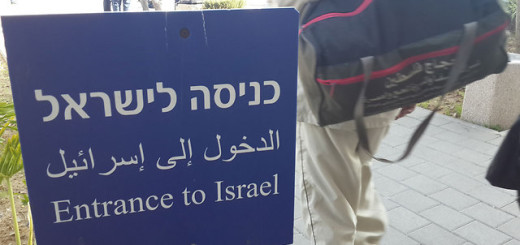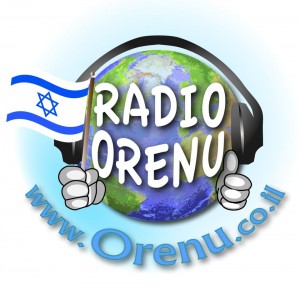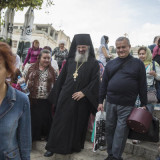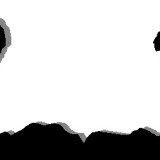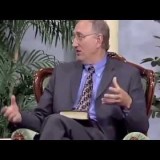Modern Chanukah Miracle: First Pure Olive Oil in 2000 Years
 For the first time in 2000 years, pure olive oil and the required vessels have been produced in full conformity with the laws of the Torah.
For the first time in 2000 years, pure olive oil and the required vessels have been produced in full conformity with the laws of the Torah.
On Monday evening, the seventh night of Chanukah, an exceptional celebration and candle-lighting service was held in the Holy City of Jerusalem thanks to the production of the first pure olive oil – according to Torah standards – in 2000 years.
The Tem ple Institute, founded in 1987, is a non-profit educational and religious organization located in the Jewish quarter of Jerusalem’s Old City. As explained on its website, “the major focus of the Institute is its efforts towards the beginning of the actual rebuilding of the Holy Temple. Towards this end, the Institute has begun to restore and construct the sacred vessels for the service of the Holy Temple.”
ple Institute, founded in 1987, is a non-profit educational and religious organization located in the Jewish quarter of Jerusalem’s Old City. As explained on its website, “the major focus of the Institute is its efforts towards the beginning of the actual rebuilding of the Holy Temple. Towards this end, the Institute has begun to restore and construct the sacred vessels for the service of the Holy Temple.”
Most recently, the Institute produced pure olive oil and the required vessels according to the laws of the Torah.
This is “another historic step towards the resumption of the Divine service in the Holy Temple, with the unveiling and presentation of the first pure olive oil for the Temple Menorah to be produced in purity in 2000 years, and the special vessels to hold them, created in purity – an unprecedented step towards the resumption of Biblical purity in our time and a true Chanukah miracle,” according to the site.
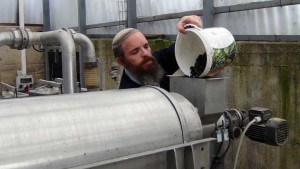 Most people are familiar with the miracle of Chanukah, according to which a small amount of oil sufficient for only one day continued to burn for eight days, as well as the victory of a small group of Jewish fighters over the massive Greek army.
Most people are familiar with the miracle of Chanukah, according to which a small amount of oil sufficient for only one day continued to burn for eight days, as well as the victory of a small group of Jewish fighters over the massive Greek army.
What they may not realize is that “the Hasmoneans created this oil under very difficult conditions,” Rabbi Richman, the Institute’s international director, says.
Manufacturing the oil and constructing the vessels according to Torah law is never a simple procedure. Yet for the first time since the destruction of the Holy Temple, the task was accomplished.
As the site explains, rabbis and staff of the Institute traveled to Moshav Ramot in the Golan Heights. Together with Einat Ziv of “Women for the Holy Temple” and Professor Hillel Weiss of Bar Ilan University, they harvested organic olives from trees that had not been treated with fertilizer, in accordance with Torah law.
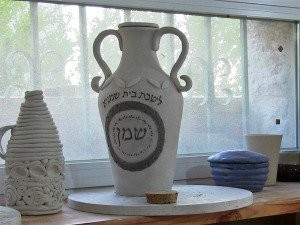 “We went up to the Golan Heights last week and harvested about 150 kilograms of olives that were grown organically,” Rabbi Richman told United with Israel. “We brought them to Beit HaBad [an olive press in the Golan Heights] to inspect according to the rules of the Torah. Out of the 150 kilos, we produced about four and a half liters of olive oil.”
“We went up to the Golan Heights last week and harvested about 150 kilograms of olives that were grown organically,” Rabbi Richman told United with Israel. “We brought them to Beit HaBad [an olive press in the Golan Heights] to inspect according to the rules of the Torah. Out of the 150 kilos, we produced about four and a half liters of olive oil.”
In the spirit of the Maccabees who fought valiantly against the forces of assimilation within ancient Greek culture, the people of Israel in this generation must continue the struggle, the Institute director stressed. “The Jewish people must do their best to stand up for what they believe in, like the Maccabees did.”
‘The Job of Man to Make Miracles Happen’
“It is the job of Man to make miracles happen,” he stated.
This past summer, the Institute launched a two-month indiegogo campaign with the goal of raising $100,000. The final tally was $104, 814. Rabbi Richman believes that this success “is in response to this generation’s feeling much closer to the time of the rebuilding of the Third Temple.”
By Atara Beck
Senior Writer/Editor, United with Israel



